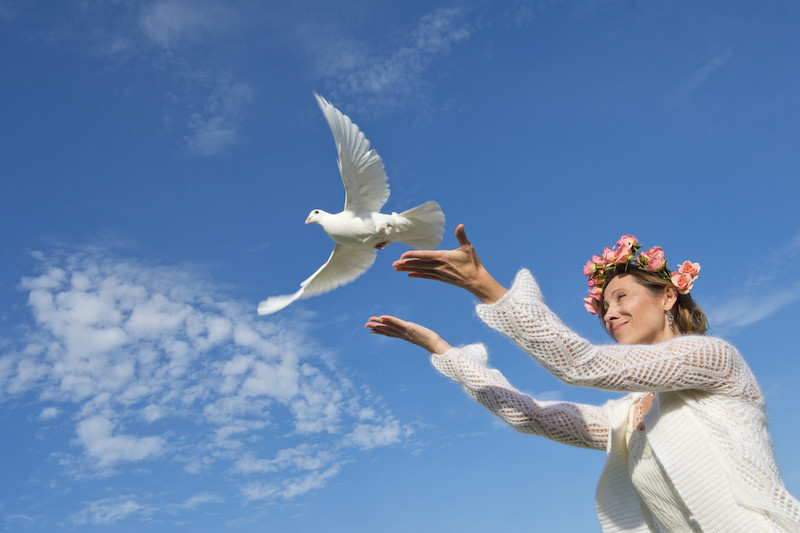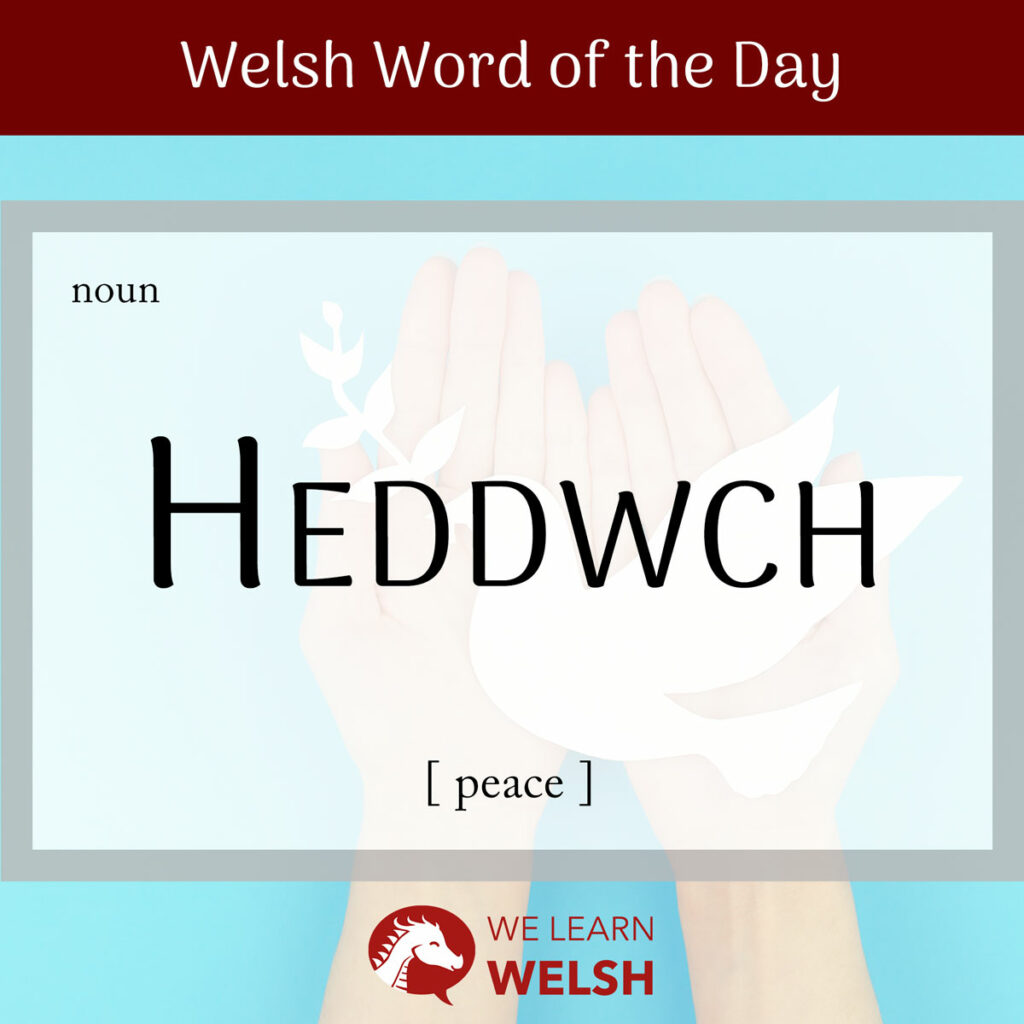Today’s Welsh word of the day is heddwch, which means peace. It’s hard to think of a more pleasant concept to discuss, so let’s dive right in!
heddwch
peace
If you’re interested in pre-modern Welsh poetry and music, you may well have come across the word hedd, a synonym. In fact, hedd is the older of the two words and a more formal and literary choice. Heddwch comes from combining this ancestor-word with the suffix –wch, common for Welsh abstract nouns, like tegwch (fairness) and tristwch (sadness).
And heddwch, in turn, has produced a few derived words. Particularly useful is heddychlon (peaceful), but you might also be interested in heddychu (to make peace with), an interesting semi-synonym of cymodi / ailgymodi (to reconcile). A pacifist is a heddychwr if male or a heddychwraig if female. Some people will use heddychwr for both, or just say pasiffist!
Since it’s an abstract noun, heddwch is almost always uncountable. A plural does exist just in case it’s ever needed, which is heddychau.
This word is masculine. It never needs to undergo any kind of mutation.
The excellent Welsh dictionary Geiriadur yr Academi (The Academy Dictionary) lists tangnefedd as another possible synonym for heddwch. I have personally never come across this word outside of religious contexts, so I’d say heddwch is a safer bet. But if it’s used in your region or dialect, I’d love to hear about it!
Another relevant word is llonydd. This is an adjective which means still, calm or peaceful. It comes up in many Welsh phrases which we’d translate in English with the word peace. For example, gad lonydd imi means give me some peace / leave me in peace.
To do something in peace is often translated with this word too. For example, to sleep in peace is cysgu’n lonydd (sleeping quietly / peacefully). And we all know that getting a good night’s cwsg (sleep) is essential to tawelwch meddwl (peace of mind, literally quietness of thinking).
Antonyms are a bit trickier to qualify with an abstract noun like this. I would consider all of the following possible antonyms to heddwch:
- rhyfel = war
- gwrthdrawiad = collision / conflict
- anhrefn = chaos
- trais = violence
- dinistr = destruction / havoc
- cynnwrf / cyffro = commotion
- helynt = trouble
Not quite as nice, right?
Ysgrifennwyd y nofel ‘Rhyfel a Heddwch’ gan awdur o Rwsia.
The novel ‘War and Peace‘ was written by a Russian author.
One practical use of this word is in the phrase mewn heddwch â (at peace with). You could say that two countries are mewn heddwch â’i gilydd (at peace with each other, literally in peace with each other). They’d surely be aiming to cadw heddwch (keep the peace) / cynnal heddwch (maintain peace), because torri’r heddwch (breaking or disturbing the peace) can have nasty consequences.
Or, if you’re talking about your credau (beliefs) and moesau (morals), you might want to express that you rhoi gwerth ar heddwch (literally “place value on peace”) or parchu heddwch (“respect peace”). Both phrases convey that peace is something you deeply value—whether on a personal level or in a political context.
Though generalisations are always dangerous, there is a strong feeling amongst many Welsh people that such a value is something common to the Welsh – that we are, in a sense, cenedl heddwch (a nation of peace).
Organisations like Academi Heddwch (The Peace Academy) point to movements like Wales’ own branch of yr Ymgyrch dros Ddiarfogi Niwclaer (the Campaign for Nuclear Disarmament), founded in Cardiff in 1958, or historical achievements like the Welsh Women’s Peace Petition, a deiseb (petition) signed by nearly 400,000 Welsh women in 1923 and 1924.
Addressed to American women, it expressed strong support for heddwch in perthnasau gwledydd (international relations) following the disastrous events of y Rhyfel Byd Cyntaf (the First World War). Its centenary was recently celebrated with a prosiect etifeddiaeth (heritage project) entitled Hawlio Heddwch (Demanding Peace).
Academi Heddwch argue that leaning into this is not only the right thing to do in a global sense, but that seeing ourselves as cenedl heddwch will help us strengthen our sense of national identity. Accordingly, they fund and support research into astudiaethau heddwch (peace studies).
They also lobby Welsh gwleidyddion (politicians) to take a stance of gwrth-filitariaeth (anti-militarism), particularly in negotiations with Westminster, which controls international relations policy for the entirety of the UK. They refer to the Nordic countries as positive examples.
Many parts of rural Wales have also historically been homing grounds for those with radically rhyddfrydig (liberal) political and social beliefs, from across the UK and even further afield. The pristine amgylchfedd naturiol (natural environment) and small communities make it an ideal place to live an alternative lifestyle.
I can tell you for certain that if you’re ever around mid-Powys, you’re certain to run into some 70s-style hipis (hippies) who are all about heddwch a chariad, mrawd i (peace and love, brother)!
Cymru (Wales) also has a strong history of Cristnogaeth (Christianity), and for many Cristnogion (Christians), heddwch is a key part of the religion. Following the example of Iesu Grist (Jesus Christ) means leaving a life that is heddychlon and hunanaberthol (self-sacrificing).
Nid oes heddwch i’r rhai annuwiol.
There is no peace for the wicked.
Peace-lovers and pacifists, whether they’re hipis, Cristnogion, both, or anything in between, use a number of symbols to express their beliefs.
- colomen = dove
- cangen olewydden = olive branch
- y lliw gwyn = the colour white
- pabi gwyn = white poppy
- enfys = rainbow
- reiffl wedi’i thorri = a broken rifle
- garan papur = paper crane

And the geometric circle-based symbol that represents yr Ymgyrch dros Ddiarfogi Niwclaer also now used much more widely to represent heddwch, particularly in a global sense.
I’d also be remiss not to mention the importance of the word heddwch in the ceremony of cadeirio’r bardd (chairing of the bard) at the Eisteddfod – a Welsh cultural festival based around competitions in the arts and literature.
The most important prize one can win at the Eisteddfod is the cadair (chair), awarded to the best bardd (bard / poet). This high honour is given out in a unique seremoni (ceremony) revolving around the cadair itself, a huge cloak, and a sword.
Once the winner has been announced, they must ascend to the stage, where the arch-druid who administers events will hold the sword above their head three times, asking the audience a oes heddwch? (is there peace?)
They’re essentially checking that everyone present agrees with the selection of winner. So, the intended response is Heddwch! (Peace!).
Ddydd a ddaw y bydd heddwch yn y byd.
A day will come when there is peace on earth.
As in any language, hoping that our loved ones have heddwch is a key part of how we ourselves make heddwch with death. Welsh gravestones often read huna mewn hedd, which is a tender, familiar and poetic way of translating rest in peace, actually meaning sleep in peace. Or, you could just translate it literally, to gorffwys mewn hedd / gorffwys mewn heddwch.
There are quite a few more phrases you can find on gravestones in Welsh cemeteries that refer to heddwch.
- Hedd, Perffaith Hedd = Peace, Perfect Peace
- Un o’r Ffyddloniaid Heddychol = One of the Peaceful Faithful
- Heddwch i’w Lwch = Peace to his Ashes
- Heddwch i’w Enaid = Peace to his Soul
- Ei Ddiwedd oedd Heddwch = His End was Peace
- Mewn Tawel Hedd = In Quiet Peace
Many people understandably don’t enjoy visiting mynwentau / claddfeydd (graveyards), but I’ve always found them to be very serene and beautiful places. Remembering those who have left this byd (world) is important, and being in their company can be a way to feel mewn heddwch ourselves.

